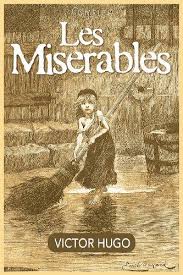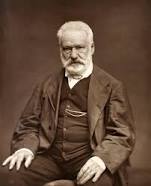Les Misérables Page #10
Les Misérables is a French historical novel by Victor Hugo, first published in 1862, that is considered one of the greatest novels of the 19th century. In the English-speaking world, the novel is usually referred to by its original French title.
However, such incidents were rare in his life. We relate those of which we know; but generally he passed his life in doing the same things at the same moment. One month of his year resembled one hour of his day. As to what became of "the treasure" of the cathedral of Embrun, we should be embarrassed by any inquiry in that direction. It consisted of very handsome things, very tempting things, and things which were very well adapted to be stolen for the benefit of the unfortunate. Stolen they had already been elsewhere. Half of the adventure was completed; it only remained to impart a new direction to the theft, and to cause it to take a short trip in the direction of the poor. However, we make no assertions on this point. Only, a rather obscure note was found among the Bishop's papers, which may bear some relation to this matter, and which is couched in these terms, "The question is, to decide whether this should be turned over to the cathedral or to the hospital." CHAPTER VIII--PHILOSOPHY AFTER DRINKING The senator above mentioned was a clever man, who had made his own way, heedless of those things which present obstacles, and which are called conscience, sworn faith, justice, duty: he had marched straight to his goal, without once flinching in the line of his advancement and his interest. He was an old attorney, softened by success; not a bad man by any means, who rendered all the small services in his power to his sons, his sons-in-law, his relations, and even to his friends, having wisely seized upon, in life, good sides, good opportunities, good windfalls. Everything else seemed to him very stupid. He was intelligent, and just sufficiently educated to think himself a disciple of Epicurus; while he was, in reality, only a product of Pigault-Lebrun. He laughed willingly and pleasantly over infinite and eternal things, and at the "crotchets of that good old fellow the Bishop." He even sometimes laughed at him with an amiable authority in the presence of M. Myriel himself, who listened to him. On some semi-official occasion or other, I do not recollect what, Count*** [this senator] and M. Myriel were to dine with the prefect. At dessert, the senator, who was slightly exhilarated, though still perfectly dignified, exclaimed:-- "Egad, Bishop, let's have a discussion. It is hard for a senator and a bishop to look at each other without winking. We are two augurs. I am going to make a confession to you. I have a philosophy of my own." "And you are right," replied the Bishop. "As one makes one's philosophy, so one lies on it. You are on the bed of purple, senator." The senator was encouraged, and went on:-- "Let us be good fellows." "Good devils even," said the Bishop. "I declare to you," continued the senator, "that the Marquis d'Argens, Pyrrhon, Hobbes, and M. Naigeon are no rascals. I have all the philosophers in my library gilded on the edges." "Like yourself, Count," interposed the Bishop. The senator resumed:-- "I hate Diderot; he is an ideologist, a declaimer, and a revolutionist, a believer in God at bottom, and more bigoted than Voltaire. Voltaire made sport of Needham, and he was wrong, for Needham's eels prove that God is useless. A drop of vinegar in a spoonful of flour paste supplies the fiat lux. Suppose the drop to be larger and the spoonful bigger; you have the world. Man is the eel. Then what is the good of the Eternal Father? The Jehovah hypothesis tires me, Bishop. It is good for nothing but to produce shallow people, whose reasoning is hollow. Down with that great All, which torments me! Hurrah for Zero which leaves me in peace! Between you and me, and in order to empty my sack, and make confession to my pastor, as it behooves me to do, I will admit to you that I have good sense. I am not enthusiastic over your Jesus, who preaches renunciation and sacrifice to the last extremity. 'Tis the counsel of an avaricious man to beggars. Renunciation; why? Sacrifice; to what end? I do not see one wolf immolating himself for the happiness of another wolf. Let us stick to nature, then. We are at the top; let us have a superior philosophy. What is the advantage of being at the top, if one sees no further than the end of other people's noses? Let us live merrily. Life is all. That man has another future elsewhere, on high, below, anywhere, I don't believe; not one single word of it. Ah! sacrifice and renunciation are recommended to me; I must take heed to everything I do; I must cudgel my brains over good and evil, over the just and the unjust, over the fas and the nefas. Why? Because I shall have to render an account of my actions. When? After death. What a fine dream! After my death it will be a very clever person who can catch me. Have a handful of dust seized by a shadow-hand, if you can. Let us tell the truth, we who are initiated, and who have raised the veil of Isis: there is no such thing as either good or evil; there is vegetation. Let us seek the real. Let us get to the bottom of it. Let us go into it thoroughly. What the deuce! let us go to the bottom of it! We must scent out the truth; dig in the earth for it, and seize it. Then it gives you exquisite joys. Then you grow strong, and you laugh. I am square on the bottom, I am. Immortality, Bishop, is a chance, a waiting for dead men's shoes. Ah! what a charming promise! trust to it, if you like! What a fine lot Adam has! We are souls, and we shall be angels, with blue wings on our shoulder-blades. Do come to my assistance: is it not Tertullian who says that the blessed shall travel from star to star? Very well. We shall be the grasshoppers of the stars. And then, besides, we shall see God. Ta, ta, ta! What twaddle all these paradises are! God is a nonsensical monster. I would not say that in the Moniteur, egad! but I may whisper it among friends. Inter pocula. To sacrifice the world to paradise is to let slip the prey for the shadow. Be the dupe of the infinite! I'm not such a fool. I am a nought. I call myself Monsieur le Comte Nought, senator. Did I exist before my birth? No. Shall I exist after death? No. What am I? A little dust collected in an organism. What am I to do on this earth? The choice rests with me: suffer or enjoy. Whither will suffering lead me? To nothingness; but I shall have suffered. Whither will enjoyment lead me? To nothingness; but I shall have enjoyed myself. My choice is made. One must eat or be eaten. I shall eat. It is better to be the tooth than the grass. Such is my wisdom. After which, go whither I push thee, the grave-digger is there; the Pantheon for some of us: all falls into the great hole. End. Finis. Total liquidation. This is the vanishing-point. Death is death, believe me. I laugh at the idea of there being any one who has anything to tell me on that subject. Fables of nurses; bugaboo for children; Jehovah for men. No; our to-morrow is the night. Beyond the tomb there is nothing but equal nothingness. You have been Sardanapalus, you have been Vincent de Paul--it makes no difference. That is the truth. Then live your life, above all things. Make use of your I while you have it. In truth, Bishop, I tell you that I have a philosophy of my own, and I have my philosophers. I don't let myself be taken in with that nonsense. Of course, there must be something for those who are down,--for the barefooted beggars, knife-grinders, and miserable wretches. Legends, chimæras, the soul, immortality, paradise, the stars, are provided for them to swallow. They gobble it down. They spread it on their dry bread. He who has nothing else has the good God. That is the least he can have. I oppose no objection to that; but I reserve Monsieur Naigeon for myself. The good God is good for the populace."
Translation
Translate and read this book in other languages:
Select another language:
- - Select -
- 简体中文 (Chinese - Simplified)
- 繁體中文 (Chinese - Traditional)
- Español (Spanish)
- Esperanto (Esperanto)
- 日本語 (Japanese)
- Português (Portuguese)
- Deutsch (German)
- العربية (Arabic)
- Français (French)
- Русский (Russian)
- ಕನ್ನಡ (Kannada)
- 한국어 (Korean)
- עברית (Hebrew)
- Gaeilge (Irish)
- Українська (Ukrainian)
- اردو (Urdu)
- Magyar (Hungarian)
- मानक हिन्दी (Hindi)
- Indonesia (Indonesian)
- Italiano (Italian)
- தமிழ் (Tamil)
- Türkçe (Turkish)
- తెలుగు (Telugu)
- ภาษาไทย (Thai)
- Tiếng Việt (Vietnamese)
- Čeština (Czech)
- Polski (Polish)
- Bahasa Indonesia (Indonesian)
- Românește (Romanian)
- Nederlands (Dutch)
- Ελληνικά (Greek)
- Latinum (Latin)
- Svenska (Swedish)
- Dansk (Danish)
- Suomi (Finnish)
- فارسی (Persian)
- ייִדיש (Yiddish)
- հայերեն (Armenian)
- Norsk (Norwegian)
- English (English)
Citation
Use the citation below to add this book to your bibliography:
Style:MLAChicagoAPA
"Les Misérables Books." Literature.com. STANDS4 LLC, 2025. Web. 6 Feb. 2025. <https://www.literature.com/book/les_mis%C3%A9rables_13>.








Discuss this Les Misérables book with the community:
Report Comment
We're doing our best to make sure our content is useful, accurate and safe.
If by any chance you spot an inappropriate comment while navigating through our website please use this form to let us know, and we'll take care of it shortly.
Attachment
You need to be logged in to favorite.
Log In